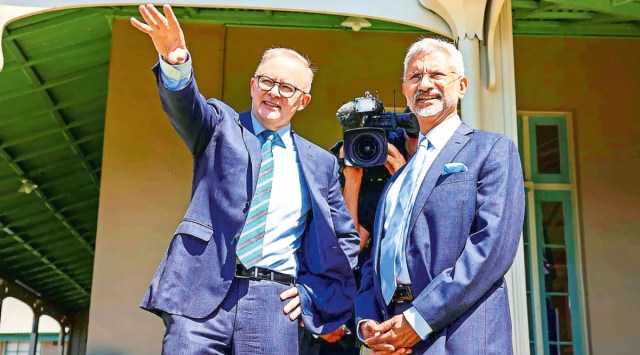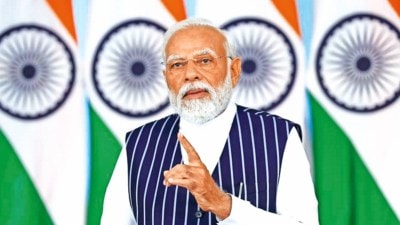Soros old, rich and dangerous: Jaishankar flags ‘fear psychosis’
Worries us because we went through colonialism... know the dangers of outside interference: EAM, in Australia
 External Affairs Minister S Jaishankar meets Australia Prime Minister Anthony Albanese in Sydney on Saturday. PTI
External Affairs Minister S Jaishankar meets Australia Prime Minister Anthony Albanese in Sydney on Saturday. PTIDays after billionaire investor George Soros criticised Prime Minister Narendra Modi and said the turmoil over the Adani Group crisis could open the “door to a democratic revival” in the country, External Affairs Minister S Jaishankar called Soros Saturday an “old, rich, opinionated” and a “dangerous” person and accused him of “scaremongering”.
The observation by Soros “worries” India as it knows the dangers of “outside interference” in politics, Jaishankar said in a reference to India’s colonial experience. On Friday, BJP leader and Union Minister Smriti Irani had hit back at Soros, saying he had “ill-intention to intervene in the democratic process of India and wanted a government that is pliable to his need”.
Responding to a question at an event in Sydney, Jaishankar claimed that what makes people like Soros dangerous is that they “invest resources in shaping narratives” under the pretence of advocacy of open society.
“I could take the view that the individual in question Mr Soros is an old, rich, opinionated person, sitting in New York, who still thinks that his views should determine how the entire world works. Now if I could stop at old, rich and opinionated, I would put it away. But he is old, rich, opinionated and dangerous,” said Jaishankar.
He was responding to a question on “occasional comments” on the undermining of democracy in India in the context of the IT department survey at the BBC New Delhi office and the remarks made by Soros ahead of the Munich security conference.
In a speech Thursday, Soros had said the turmoil over Gautam Adani’s business empire has shaken faith in India and threatened investor confidence and this could open the “door to a democratic revival” in the country.
Soros, who has funded Democratic Presidential candidates in the US over the years, said the Prime Minister will have “to answer questions” from foreign investors and Parliament on allegations against the Adani firms. “Modi and business tycoon Adani are close allies, their fate is intertwined,” he had said.
“How do you explain this when you are dealing with Quad ministers in particular as well as others?” Justin Bassi, executive director of Australian Strategic Policy Institute asked Jaishankar, who was flanked by Minister for Climate Change and Energy of Australia Chris Bowen.
In his sharply worded response, Jaishankar asserted that not everyone recognises the fact that the world is “changing, rebalancing, is less Euro-Atlantic” as “old habits die hard”.
This is part of the External Affairs Minister’s sustained political pushback against commentators in the West who have often criticised what they call the democratic backslide in India.
“There are still people in the world who believe that their definition, their preferences, their views must override everything else. Since you mentioned this specific example, I don’t know how people are familiar with what was said at the Munich conference. Essentially Mr Soros said that India is a democratic country but he doesn’t think that the Prime Minister of India is a democrat. And by the way, a few years ago, in the same conference, I was there at that time, he actually accused us of planning to strip millions of Muslims of their citizenship, which, of course, didn’t happen. It was a ridiculous suggestion,” Jaishankar said.
Such comments amount to “scaremongering”, said Jaishankar, adding “it actually does damage to our societal fabric”. He suggested that Soros, who is the founder of Open Society Foundations, also creates “fear psychosis”.
“If you do this kind of scaremongering like millions of people will be deprived of citizenship it actually does real damage to our societal fabric. Because somebody out there believes you. And you don’t leave it to accident, you back it up with an operation. So you create that kind of fear psychosis and then you use that to validate your original judgment,” he said.
It is clear that Soros has very “strong political preferences”, said Jaishankar, listing India’s democratic credentials, particularly in terms of participation of people in electing leaders and forming governments.
“He actually thinks that it doesn’t matter that this is a country of 1.4 billion people whose voters decide how the country should run. And again I cite him as an extreme example. But there are other manifestations of this in different countries where people like him think that an election is good if the person we want to see wins,” Jaishankar said.
A democracy is labelled as “flawed” if the election throws up an outcome which is not in line with what people like Soros expect, he said, adding that “all this is done under the pretence of advocacy of open society, transparency etc.”
“So our generation, we have grown up with concepts like regime change…Now you can call it what you will, but this really looks the same with a gloss of some kind of do-good-ism on it,” the minister said.
India is not among countries where results of elections are challenged in courts as it registers unprecedented voter turnouts, and decisive electoral outcomes, Jaishankar said.
“It (comments made by Soros) worries us because we are a country which went through colonialism. We know the dangers of what happens when there is outside interference in whatever guise in your politics,” he said.
Soros’s remarks that the turmoil over Adani’s business empire has shaken faith in India and threatened investor confidence, which could open the “door to a democratic revival” in the country has triggered a major row drawing sharp reactions from the ruling BJP.
In Sydney, Jaishankar also met Australian Prime Minister Anthony Albanese and Foreign minister Penny Wong Saturday.
They discussed the bilateral strategic partnership, economic opportunities, people-to-people ties, besides exchanging ideas on the Indo-Pacific region and cricket, ahead of Albanese’s trip to India early next month.







